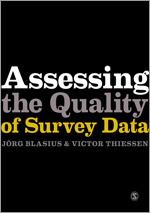Assessing the Quality of Survey Data
- Jörg Blasius - Institute for Political Science and Sociology, University of Bonn, Germany
- Victor Thiessen - Dalhousie University, Canada
Survey Research
This is an innovative book. Blasius and Thiessen show how careful data-analysis can uncover defects in survey data, without having recourse to meta-data or other extra information. This is good news for researchers who work with existing data sets and wish to assess their quality
Joop Hox
Professor of social science methodology, Utrecht University
'This illuminating and innovative book on the quality of survey data focuses on screening procedures that should be conducted prior to assessing substantive relations. Numerous tables and visual displays based on appropriate analyses show convincing examples of procedural deficiencies, data duplicates, and faked interview, and unusual patterns in well known international datasets. Blasius and Thiessen discuss openly what is mostly covered in survey reporting, and they show ways to improve the reliability of conclusions based on survey data. A must for survey practitioners and users
Jaak Billiet
Emeritus professor in social methodology, University of Leuven
'I hope that many social science researchers will read Jörg Blasius and Victor Thiessen's book and realize the importance of the lesson it provides, which is that many of our data sets contain serious errors which may lead to wrong conclusions if not wrong theories. Applying the suggested tests can prevent this.
Willem Saris
Director of RECSM, Universitat Pompeu Fabra, Barcelona
This is an important, groundbreaking analysis of survey data quality that serves as an indispensable vade mecum for anyone engaged in gathering, analysing or utilising survey data. Clearly quality is not always what is appears to be... Assessing the Quality of Survey Data... addresses this issue in far more detail than any other work known to this reviewer.
Maryam Nazari and G. E. Gorman
Online Information Review
Assessing the Quality of Survey Data has been written for all researchers who want to be good data detectives... This book has some considerable strengths. It really got me to reflect on the assumptions I had made about data sets I had handled. It highlighted how relatively easy it is to spot data issues early on in analysis. It also made me think of response style challenges to be more than a survey design/sampling issues and to include much more data screening. Although I won’t be setting up my own detective agency, I have certainly picked up some sleuthing tips.
Catherine Owens
SR: Reviews
This book will help students learn how to assess the quality of the materials they use and of the data used for the conclusions they receive.
Sample Materials & Chapters
Chapter 4: wvs2005-2008_duplicated pattern
Chapter 4: ess-2002-trustdata.sps
Chapter 4: ESS2002-trustitems.xlxs
Chapter 4: WVS2005-2008_duplicated cases.xls
Chapter 4: wvs2005-2008_duplicated pattern.xls
Chapter 5: ess2006-feelingdata.sps
Chapter 6: cnes1984_poleff.sps
Chapter 7: cnes1984_poleff.sps
Chapter 7: dirtydataindexcalculations.xlxs
Chapter 8: pisa2000-countrydata.xlxs
Chapter 8: pisa2000-countrydeciles.xlxs
Chapter 8: pisa2003-countrydata.xlxs





